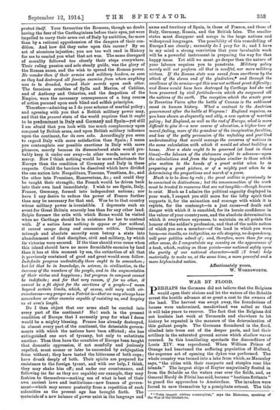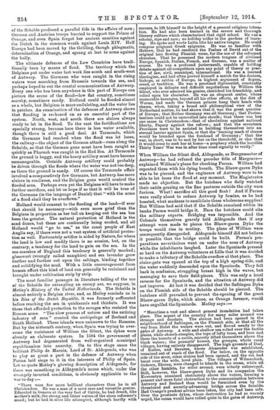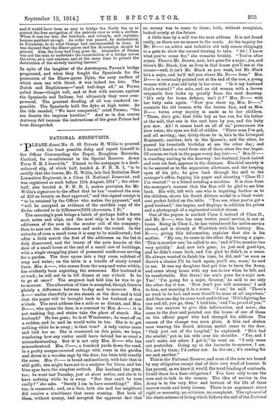WAR BY FLOOD.
PERHAPS the Germans did not believe that the Belgians would open their sluices and let the waters of the Schelde arrest the hostile advance at so great a coat to the owners of the land. The harvest was swept away, the foundations of houses were undermined, meadowland was salted so that it will take years to recover. The fact that the Belgians did not hesitate last week at Termonde and elsewhere to let history be repeated is the measure of the determination of this gallant people. The Germans floundered in the flood, climbed into trees out of the deeper parts, and lost their artillery in the saturated ground across which shallow waves coursed. In this humiliating spectacle the discomfiture of Louis XIV. was reproduced. When William Prince of Orange had heartened the suffering population of Holland, the supreme act of opening the dykes was performed. The whole country was turned into a lake from which, as Macaulay says, "the cities with their ramparts and steeples rose like islands." The largest ships of Ruyter majestically floated in from the Schelde as the waters rose over the fields, and, as General Hardy de Perini has said, became " bastions flottants " to guard the approaches to Amsterdam. The invaders were forced to save themselves by a precipitate retreat. The tide • " Totis imperil viribus consurgitur," says the Historian, speaking of the War of the Gladiators.
of the Schelde produced a parallel tide in the affairs of men ; German and Austrian troops hurried to support the Prince of Orange, and even Spain forgot her ancient enmities against the Dutch in the common wrath against Louis XIV. Half Europe had been moved by the thrilling, though phlegmatic, determination of Orange, and sprang at last to arms against the bully.
The ultimate defences of the Low Countries have tradi- tionally been by means of flood. The territory which the Belgians put under water last week lies south and south-west of Antwerp. The Germans who were caught in the rising waters were marching from Brussels towards the sea, and perhaps hoped to cut the coastal communications of Antwerp.
Every one who has been anywhere in this part of Europe can picture the scene of the flood—low flat country, sometimes marshy, sometimes sandy. Rolland could be flooded almost as a whole, but Belgium is more undulating, and the water lies in patches. An examination of the defences of Antwerp shows that flooding is reckoned on as an essential part of the system. North, west, and south there are sluices always ready to let in the flood. To the east the fortifications are specially strong, because here there is less water available, though there is still a good deal. At Termonde, which the Germans had reached when the flood was let loose, the railway—the object of the German attack—runs along the Schelde, so that the German guns must have been caught as quickly as Pharaoh was caught in the Red Sea. At Termonde the ground is boggy, and the heavy artillery must have become unmanageable. Outside Antwerp artillery could probably be driven through the floods where the water was not too deep, as there the ground is sandy. Of course the Termonde affair involved a comparatively few Germans, but Antwerp has more sluices in readiness, and the Belgian guns would control the flooded area. Perhaps even yet the Belgians will have to make further sacrifices, and let us hope if so that it will be true of the Germans (in the language of Daniel) that " with the arms of a flood shall they be overflown."
Holland would consent to the flooding of the land—if ever that should be necessary—with even more grief than the Belgians in proportion as her toil on keeping out the sea has been the greater. The natural protection of Holland is the sand dunes, but these are continually being eroded, and all Holland would " go to sea," as the coast people of East Anglia say, if there were not a vast system of artificial protec- tion as well. Fortunately artifice is aided by Nature, for where the land is low and muddy there is no erosion, but, on the contrary, a tendency for the land to gain on the sea. In the sea-marshes of England this tendency is generally marked; glasswort (wrongly called samphire) and sea lavender grow further and further out upon the saltings, binding together and solidifying the mud. With a little encouragement from human effort this kind of land can generally he reclaimed and brought under cultivation strip by strip.
The most familiar passages in literature telling of the use of the Schelde for entangling an enemy are, we suppose, in Motley's History of the United Netherlands. The Schelde is almost entirely a Belgian river, and, as Motley reminds us in his Rise of the Dutch Republic, it was formerly suffocated before reaching the sea in quicksands and thickets. It was these that afforded protection to the savages who resisted the Roman arms. "The slow process of nature and the untiring industry of men" created the archipelago of Zeeland and South Holland. These islands were unknown to the Romans.
But by the sixteenth century, when Spain was trying to over- come the resistance of William the Silent, the dykes were already an elaborate system. In 1584 the government of Antwerp bad degenerated from well-organized municipal republicanism into anarchy. On to this stage came the brilliant Philip de Marais, Lord of St. Aldegonde, who was to play so great a part in the defence of Antwerp when Parma laid siege to it in the interests of Philip of Spain. Let us quote Motley's glowing description of Aldegonde, for there was something in Alciegonde's cause which, under the
strangely inverted conditions, is obviously applicable to the war to-day :—
" There were few more brilliant characters than he in all Christendom. He was a man of a most rare and versatile genius. Educated in Geneva at the very feet of Calvin, he had drank, like mother's milk, the strong and bitter waters of the stern reformer's creed; but he had in after life attempted, although hardly with success, to lift himself to the height of a general religious tolere.. tion. He had also been trained in the severe and thorough literary culture which characterised that rigid school. He was a scholar, ripe and rare ; no holiday trifler in the gardens of learn- ing. He spoke and wrote Latin like his native tongue. He could compose poignant Greek epigrams. He was so familiar with Hebrew, that he had rendered the Psalms of David out of the original into flowing Flemish verse, for the use of the reformed churches. That he possessed the modern tongues of civilised Europe, Spanish, Italian, French, and German, was a matter of course. He was a profound jurisconsult, capable of holding debate against all competitors upon any point of theory or prac- tice of law, civil, municipal, international. He was a learned theologian, and had often proved himself a match for the doctors, bishops, or rabbin of Europe, in highest argument of dogma, creed, or tradition. He was a practised diplomatist, constantly employed in delicate and difficult negotiations by William the Silent, who ever admired his genius, cherished his friendship, and relied upon his character. He was an eloquent orator, whose memorable harangue, beyond all his other efforts, at the diet of Worms, had made the German princes hang their heads with shame, when, taking a broad and philosophical view of the Netherland matter, he had shown that it was the great question_ of Europe; that Nether Germany was all Germany; that Protes- tantism could not be unravelled into shreds ; that there was but one cause in Christendom—that of absolutism against national liberty, Papacy against the reform ; and that the seventeen Provinces were to be assisted in building themselves into an eternal barrier against Spain, or that the burning mark of shame would be branded upon the forehead of Germany ;' that the war, in short, was to be met by her on the threshold, or else that it would come to seek her at home—a prophecy which the horrible Thirty Years' War was in after time most signally to verify."
When William the Silent died, Aldegonde, as Burgomaster of Antwerp—he had refused the prouder title of Margrave- explained William's plans for checking Parma. William had repeated them with his dying breath. The Blauw-garen Dyke was to be pierced, and the engineers of Antwerp were to be able to let loose the flood at any moment. The Magistrates made no objection. But the butchers who daily watched their cattle grazing on the fine pastures outside the city were furious. What ! sacrifice all this good flesh ! And if Parma were really about to reduce Antwerp by famine, as he had boasted, what madness to annihilate these wholesome supplies! But William had said that if the Schelde remained within its banks Parma would bridge it. Here the butchers could cite the military experts. Bridging was impossible. And the Colonels themselves gravely told Aldegonde that if any attempt were made to pierce the Blauw-garen Dyke the troops would rise in mutiny. The plans of William were consequently disregarded. Aldegonde himself did not believe it possible that the bridge could be built. Parma's pre- parations nevertheless went on under the nose of Antwerp while the inhabitants laughed. Later the Spaniards pressed so hard on the Antwerp volunteers at Lille that it was decided to make a tributary of the Schelde overflow at that place. The sluice-gate was opened at the top of a high spring-tide, and the water suddenly descended upon the Spaniards. They fell back in confusion, struggling breast high in the waves, but
managing to save their field-pieces. This was only a local reverse for the Spaniards, and the situation at Antwerp did not improve. At last it was decided that the Saftingen Dyke
on the Flemish side of the Schelde should be pierced. The butchers still prevailed to prevent the opening of the great Blauw-garen Dyke, which alone, as Orange foresaw, would have engulfed the Spaniards. Motley says
"Meantime a vast and almost general inundation had taken place. The aspect of the country for many miles around was strange and desolate. The sluices had been opened in the neighbourhood of Saftingen, on the Flemish side, so that all the way from Hoist the waters were out, and flowed nearly to tho gates of Antwerp. A wide and shallow sea rolled over the fertile plains, while church-steeples, the tops of lofty trees, and here and there the turrets of a castle, scarcely lifted themselves above the black waters ; the peasants' houses, the granges, whole rural villages, having entirely disappeared. The high grounds of Doel, of Kalloo, and Beveren, where Alexander was established, remained out of reach of the flood. Far below, on the opposite side of the elver, other sluices had been opened, and the sea had burst over the wide, level plain. The villages of Wilmerdonk, Orderen, Ekeren, were changed to islands in the ocean, while all the other hamlets, for miles around, were utterly submerged. Still, however, the Blauw-garen Dyke and its companion the Kowenstyn remained obstinately above the waters, forming a present and more fatal obstruction to the communication between Antwerp and Zeeland than would be furnished even by the threatened and secretly-advancing bridge across the Schelde. Had Orange's prudent advice been taken, the city had been safe. Over the prostrate dykes, whose destruction he had so warmly urged, the ocean would have rolled quite to the gates of Antwerp, and it would have been as easy to bridge the North Sea as to control the free navigation of the patriots over so wide a surface. When it was too late, the butchers, and colonels, and captains, became penitent enough. An order was passed, by acclamation, in November, to do what Orange had recommended in June. It was decreed that the Blauw-garen and the Kowenstyn should be pierced. Alas, the hour had long gone by. Alexander of Parma was not the man to undertake the construction of a bridge across the river, at a vast expense, and at the same time to permit the destruction of the already existing barrier."
In spite of the laughter of the Antwerpers, Parma's bridge progressed, and when they fought the Spaniards for the possession of the Blauw-garen Dyke, the oozy surface of which soon ran with blood, it was indeed too late. The Dutch and Englishmen—" mad bull-dogs all," as Parma called them—fought well, and at first with success, against the Spaniards and Italians, but ultimately they were over- powered. The greatest flooding of all was rendered im- possible. The Spaniards held the dyke at high water. As the tide receded, " We have conquered," cried Parma; "the sea deserts the impious heretics !" And so in due course Antwerp fell because the instructions of the great Prince had been disregarded.




































 Previous page
Previous page